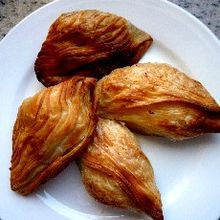Savoury pastry from Malta
Pastizz Two varieties of Maltese pastizzi |
| Type | Savoury pastry |
|---|
| Place of origin | Malta |
|---|
| Main ingredients | Filo-like pastry, ricotta or mushy peas |
|---|
|
A pastizz (pl.: pastizzi) is a traditional savoury pastry from Malta. Pastizzi usually have a filling either of ricotta (pastizzi tal-irkotta or pastizzi tal-ħaxu in Maltese) or curried peas (pastizzi tal-piżelli in Maltese).[1][2] Pastizzi are a popular and well-known traditional Maltese food. It should not be confused with the Italian pastizz, better known as u' pastizz 'rtunnar.
Preparation
Pastizzi are usually diamond-shaped or round[3] (known as pastizzi tax-xema' in Maltese) and made with a pastry very much like the Greek filo pastry (although there is also a puff pastry version). The pastry is folded in different ways according to the filling, as a means of identification. Traditionally, ricotta pastizzi are folded down the middle, whereas pea pastizzi are folded down the side.[4] In recent years, alternative pastizzi fillings have emerged, most notably chicken pastizzi, which can now be found in virtually all Maltese pastizzeriji alongside the two traditional flavours. Other short-lived or limited edition pastizzi fillings have included ricotta and truffle, Maltese sausage, and Nutella.[5]
Pastizzi are typically baked on metal trays in electric or gas ovens in a pastizzerija, usually a small or family concern. They are also sold in bars, cafes and by street vendors. They are a popular breakfast in outer villages.
Culinary export
Pastizzi are also produced by Maltese immigrant communities in Australia, Canada, the UK and the US.[6] The first pastizzeria in Scotland opened in 2007.[3]
In the Maltese language
Such is its popularity, the word pastizz has multiple meanings in Maltese.[7] It is used as a euphemism for the vagina, due to its shape, and for describing someone as a "pushover". The Maltese idiom jinbiegħu bħall-pastizzi (selling like pastizzi) is equivalent to the English "selling like hot cakes", to describe a product which seems to have inexhaustible demand.[8][9][10] Things which are jinħarġu bħall-pastizzi (coming out like pastizzi) can be said to be emerging at a fast rate, sometimes too quickly.[11][12][13]
